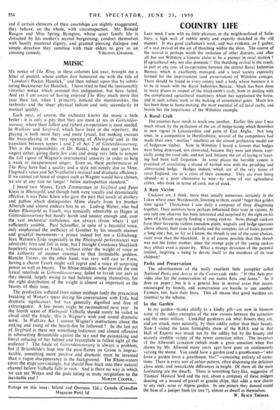MUSIC
MY notice of The Ring, in these columns last year, brought me a letter of protest, whose author first honoured me with the title of " London's Pocket Hanslick," and then refined upon this by substi- tuting Beckmesser for Hanslick. I have tried to find the (presumably vitriolic) notice which aroused this indignation, but have failed. And yet I am aware of having enjoyed The Ring much more this year than last, when I primarily noticed the monstrosities, the verbosity and the sheer physical tedium and only secondarily its musical quality.
Each year, of course, the orchestra knows the music a little better ; it is only a pity that they are most at sea in Giitterdiim- merung, where their fullest and richest co-operation is most needed. In Walkiire and Siegfried, which have been in the repertory, the playing is both more fiery and more lyrical, but nothing excuses the brass-playing at the very opening of Rheingold and in the transition between scenes I and 2 of Act 2 of Goiterdiinunerung. This is the responsibility of Dr. Rankl, who does not spare his singers either, giving them few cues and doing very little to temper the full rigour of Wagner's instrumental sonority in order to help a weak or inexperienced singer. Even so, these performances of The Ring have had a quality and a style not simply due to Mme. Flagstad's voice and Set Svanholm's musical and dramatic efficiency. If we cannot yet boast of singers such as Wagner would have chosen, we are at any rate no longer " below metropolitan standard."
I heard two Mimes, Erich Zimmerman in Siegfried and Peter Klein in Rheingold. and though both were vocally and dramatically effective, it was Peter Klein who gave the part that touch of drollery and pathos which distinguishes Mime clearly from his brother Alberich and almost endears him to us. Ludwig Weber, who had stolen Rheingold as Fasolt, was musically admirable as Hagen in Gotterdiimmerung but hardly harsh and sinister enough and, over the vast orchestral turbulence, not always (from where I sat) sufficiently audible. Paul Schoeffler, in spite of a beautiful voice, only emphasised the inefficacy of Gunther by his smooth manner and graceful movements—a prince indeed but not a Gibichung. Jean Watson's Erda (especially in the Rheingold performance) was admirably firm and full in tone, but I thought Constance Shacklock hopelessly miscast as Fricka, without either the weight of voice or the authority of manner essential to that formidable goddess. Blanche Turner, on the other hand, was very well cast as Freia, having a charm Fasolt might well regret and a voice of surprising power as well as beauty. The Rhine-maidens, who provide the one lyrical interlude in Gotterdiimmerung, failed to ravish our ears as they should, largely owing to bad balance among themselves, for the right distribution of the weight is almost as important as the beauty of their tone.
The production suffered from minor mishaps (only the precocious breaking of Wotan's spear during his conversation with Erda had dramatic signficance), but was generally dignified and free of extravagance. A few points might be reconsidered next year In the fourth scene of Rheingold Valhalla should surely be veiled in cloud until the finale ; this is Wagner's wish and sound dramatic sense. In Walkiire Act I cannot Wagner's instfuctions about the sinking and rising of the hearth-fire be followed ? In the last act of Siegfried is there not something ludicrous and almost offensive in silhouetting Briinnhilde against the sky and the painstaking and literal unlacing of her helmet and breastplate in fullest sight of the audience ? The finale of Giitterdiimmerung is always a problem, but if Briinnhilde's leap into the pyre-flames on Grane is imprac- ticable, something more positive and dramatic must be invented than a vague disappearance in the background. The Rhine-waters cover the stage convincingly, but should flow back into their natural channel before Valhalla falls in ruin. And is there no way in which we can see Wotan and the gods sitting in mute resignation to the


































 Previous page
Previous page